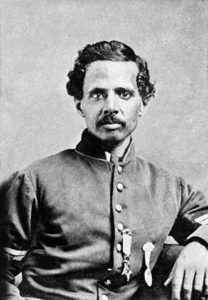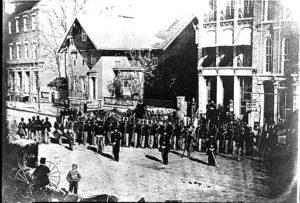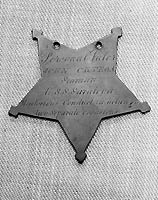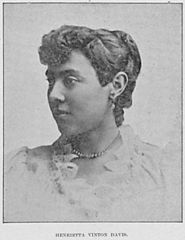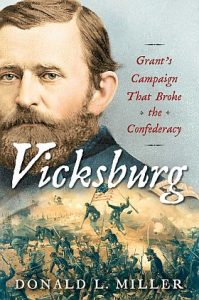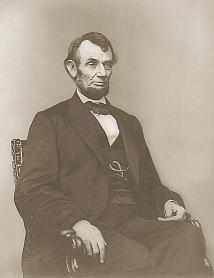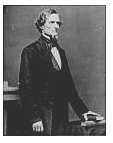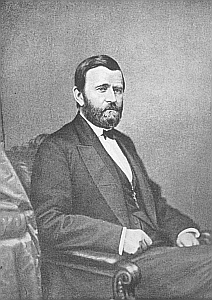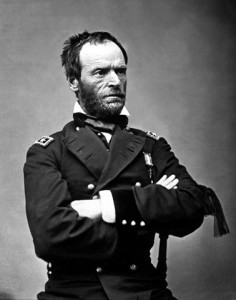Powhatan Beaty’s Early Life
Powhatan Beaty was born into slavery on October 8, 1837, in Richmond, Virginia. Beaty’s African-American parents were free, but baby Powhatan was a slave because freedom was not granted to children of freed slaves in the South.
Beaty became a freeman when he was twelve years old sometime in 1849 after his family took him to Cincinnati, Ohio. Beaty went to school and gained a good education. He was taught by a teacher and abolitionist named Peter H. Clark. While performing in a school concert, the young Beaty fell in love with acting. After completing his education Powhatan became an apprentice furniture maker under Henry Boyd, a prosperous African-American manufacturer.
Beaty was a furniture maker for twenty years laboring as a lathe operator, a sawyer, and a cabinet maker. Beaty’s love of performing and theater continued during this time and he studied acting. An acting instructor whom Beaty studied under was James E. Murdock, a former professional Philadelphia actor. Beaty’s name can be found listed in and mentioned in amateur theater performances and political columns from his times.
Beaty and the Black Brigade
On August 12, 1862, Confederate Colonel John Hunt Morgan, nicknamed the “Thunderbolt of the Confederacy,” began a cavalry raid into Kentucky behind Union lines. Near Gallatin, he burned the Louisville and Nashville Railroad tunnels. These tunnels were crucial to General Don Carlos Buell’s supply line during his Chattanooga Campaign. On August 30, 1862, the Confederates decidedly won the Battle of Richmond, Kentucky when Major General Edmund Kirby Smith defeated Union Major General William “Bull” Nelson’s troops that were defending Richmond.
With the success of Morgan and his cavalry, and the Union loss at Richmond, Kentucky, Cincinnati, Ohio was in danger and on alarm. Cincinnati was only 100 miles north of Richmond and there were no Union troops between the two cities. On September 2, aware of the threat to their city, the men of Cincinnati began forming work units to build defensive fortifications to help protect their city from Confederate attacks.
African-American men of Cincinnati were forced into military service at bayonet point to help build the fortifications. They were treated poorly. William M. Dickson was made commander of the African-Americans, and then their treatment improved. Dickson promised them that they would be kept together in a unit called the Black Brigade and that they would be treated fairly. He allowed approximately 400 African-American men to return to their homes on September 4 so they could prepare their families for their absence while they served. They were to report for duty the next morning. That morning brought a surprise when approximately 700 African-American men instead of 400 reported for duty. Powhatan Beaty came to serve that morning in the Black Brigade’s Company One of the Third Regiment, which was sent into Kentucky near the Licking River to construct defenses.
The Black Brigade was unarmed and dangerously far in front of the Union line. They worked for fifteen days building forts, roads, trenches, and rifle pits in preparation for the threat of Confederate movement toward Cincinnati. Their fortification efforts would not be used, but Union General Lew Wallace said that their work and not “the guns,” ought to have the credit for protecting Cincinnati from the Confederates. On September 20, the threat of Confederate attack had ended and the Black Brigade was disbanded. The men returned home. Powhatan Beaty’s membership in the Black Brigade brought him his first taste of military service.
Beaty In the Civil War
Powhatan Beaty joined the Union Army on June 7, 1863, for a three-year term when he was twenty-five years old. Soon he was promoted from private to sergeant. Sergeant Beaty and the forty-seven African-American Union soldiers he led were ordered to Columbus, Ohio. Beaty and his men were expected to join either the 54th or 55th Massachusetts Infantry Regiments in Boston. These were the only recognized African-American units at the time. At Columbus, it was learned these two Massachusetts regiments were already full.Ohio’s Governor David Tod wanted to form an Ohio regiment of African-American soldiers. He asked for permission to do so from the United States Department of War and he was given permission on June 17, 1863. Beaty and his troops became part of the newly formed African-American 127th Ohio Volunteer Infantry. Later, the 127th Ohio Volunteer Infantry became the 5th United States Colored Troops (5th USCT). The 5th USCT spent three months of organization, preparation, and recruitment at Camp Delaware in Ohio.
On December 8, 1863, they experienced their first action at Sandy Swamp, then the 5th USCT were in the main Richmond-Petersburg Campaign, they took part in the taking of City Point on May 4, 1864. The 5th USCT was in the Petersburg trenches, and on July 30, 1864, they were part of the assault in the Battle of the Crater. Next, they were sent to the Virginia battlefield front lines.
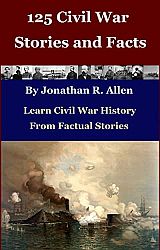 Does reading about Civil War history from long and dry academic-like books bog you down and cause you to lose interest? Would you like to read interesting stories based on facts of the Civil War, stories that inform you and move along with the war’s history? Does having to read from cover to cover tire you and cause you to drag through a history book? Would you prefer the freedom to skip around in a book and learn story-by-story about the Civil War? If you answered “yes” to any of these questions, then the factual stories in 125 Civil War Stories and Facts will help you learn Civil War history. The stories are informative and entertaining and it’s a fun way to learn about the Civil War. Do books like Civil War Trivia and Fact Book by Webb Garrison or The Civil War: Strange & Fascinating Facts by Burke Davis interest you? Then you will find 125 Civil War Stories and Facts follows in their tradition of providing the reader with rich and interesting information about the Civil War. Available as a Kindle device e-book or as a paperback. Get 125 Civil War Stories and Facts now!
Does reading about Civil War history from long and dry academic-like books bog you down and cause you to lose interest? Would you like to read interesting stories based on facts of the Civil War, stories that inform you and move along with the war’s history? Does having to read from cover to cover tire you and cause you to drag through a history book? Would you prefer the freedom to skip around in a book and learn story-by-story about the Civil War? If you answered “yes” to any of these questions, then the factual stories in 125 Civil War Stories and Facts will help you learn Civil War history. The stories are informative and entertaining and it’s a fun way to learn about the Civil War. Do books like Civil War Trivia and Fact Book by Webb Garrison or The Civil War: Strange & Fascinating Facts by Burke Davis interest you? Then you will find 125 Civil War Stories and Facts follows in their tradition of providing the reader with rich and interesting information about the Civil War. Available as a Kindle device e-book or as a paperback. Get 125 Civil War Stories and Facts now!
Powhatan Beaty and the Battle of Chaffin’s Farm
The Battle of Chaffin’s Farm and New Market Heights was fought on September 29 – 30, 1864, as part of the Union Siege of Petersburg. Powhatan Beaty was now the first sergeant of Company G, an all African-American regiment. Company G was ordered to attack the center of the Confederate position of New Market Heights. This was a daunting order, like a suicide mission. Intense fighting ensued with great bloodshed. Company G’s color bearer was killed during a retreat, the colors falling on the battlefield. Beaty risked his life going back 600 yards to retrieve the colors and return them to Company G’s lines. All eight officers of Company G were killed. With no officers left, first sergeant Beaty took command and bravely led his men in an aggressive attack, successfully pushing the Confederates out of their defensive position.
Chaffin’s Farm was a costly victory for the Union. Over 50 percent of Company G were killed, wounded, or taken prisoner. Company G had eighty-three enlisted men in the battle at Chaffin’s farm. Only sixteen of them, including Beaty, came through the battle without being either wounded or killed. Beaty was commended by General Ben Butler for his bravery and leadership in the Battle of Chaffin’s Farm. Beaty’s regimental commander twice recommended him for promotion to become a commissioned officer. Nothing ever came of that promotion.
Learn Civil War History Podcast – Powhatan Beaty: African American Civil War Medal of Honor Recipient
Spotify
After Chaffin’s Farm, the two corps of the Army of the James were reorganized on December 3, 1864. The Army of the James units made up of whites became the XXIV Corps and the African-American units became the XXV Corps. Company G was part of the new XXV Corps led by Major General Godfrey Weitzel. Company G took part in the assaults on Fort Fisher, North Carolina, and was with General William Tecumseh Sherman’s Campaign of the Carolinas as it turned northward.
When General Joseph Johnson surrendered to Sherman at Bennett Place in Durham, North Carolina on April 26, 1865, the last surrender of a major Confederate army, Company G was there. However, the Civil War was effectively over with Robert E. Lee’s earlier surrender to Ulysses S. Grant at Appomattox Court House on April 9, 1865. When Company G was taken out of service on September 20, 1865, Powhatan Beaty had fought in thirteen battles and numerous skirmishes during his service in the United States Army.
Awarded the Medal of Honor
On April 6, 1865, First Sergeant Powhatan Beaty was awarded the Medal of Honor by President Abraham Lincoln for his actions at the Battle of Chaffin’s Farm.
Here is President Abraham Lincoln’s General Orders for Beaty’s Medal of Honor Citation:
“GENERAL ORDERS:“CITATION:
“The President of the United States of America, in the name of Congress, takes pleasure in presenting the Medal of Honor to First Sergeant Powhatan Beaty, United States Army, for extraordinary heroism on 29 September 1864, while serving with Company G, 5th Colored Infantry, in action at Chapin’s Farm, Virginia. First Sergeant Beaty took command of his company, all the officers having been killed or wounded, and gallantly led it.”
Note: President Lincoln misspelled the Battle of Chaffin’s Farm’s name.
Powhatan Beaty After the Civil War
After the Civil War, Powhatan Beaty came back to Cincinnati where he married a woman named Mary C. Lee and he returned to cabinet making. Beaty continued on with his interest in acting and the theater. In the mid-1800s he joined with Henrietta Vinton Davis, a noted African-American Shakespearean actress, together they staged a musical and festival. The two took on the leading roles in dramatic performances of scenes from Shakespeare’s Macbeth. They were successful and took their show on the road, having great turnouts for their performances.Powhatan Beaty wrote a play telling of the positive challenges that he and other African-Americans experienced while transitioning from slavery to freedom after the Civil War. He helped to form the Literary and Dramatic Club of Cincinnati and in 1888 he was the club’s drama director. In the African-American community of Cincinnati Beaty was known as an elocutionist for charitable purposes.
The African-American cabinet maker, soldier, actor, and Medal of Honor holder Powhatan Beaty died at seventy-nine years old on December 6, 1916. He is buried in Cincinnati at the Union Baptist Cemetery.
Learn Civil War History Podcast Episode Seven: Freedman Jourdon Anderson Writes A Letter To His Old Master
Spotify
